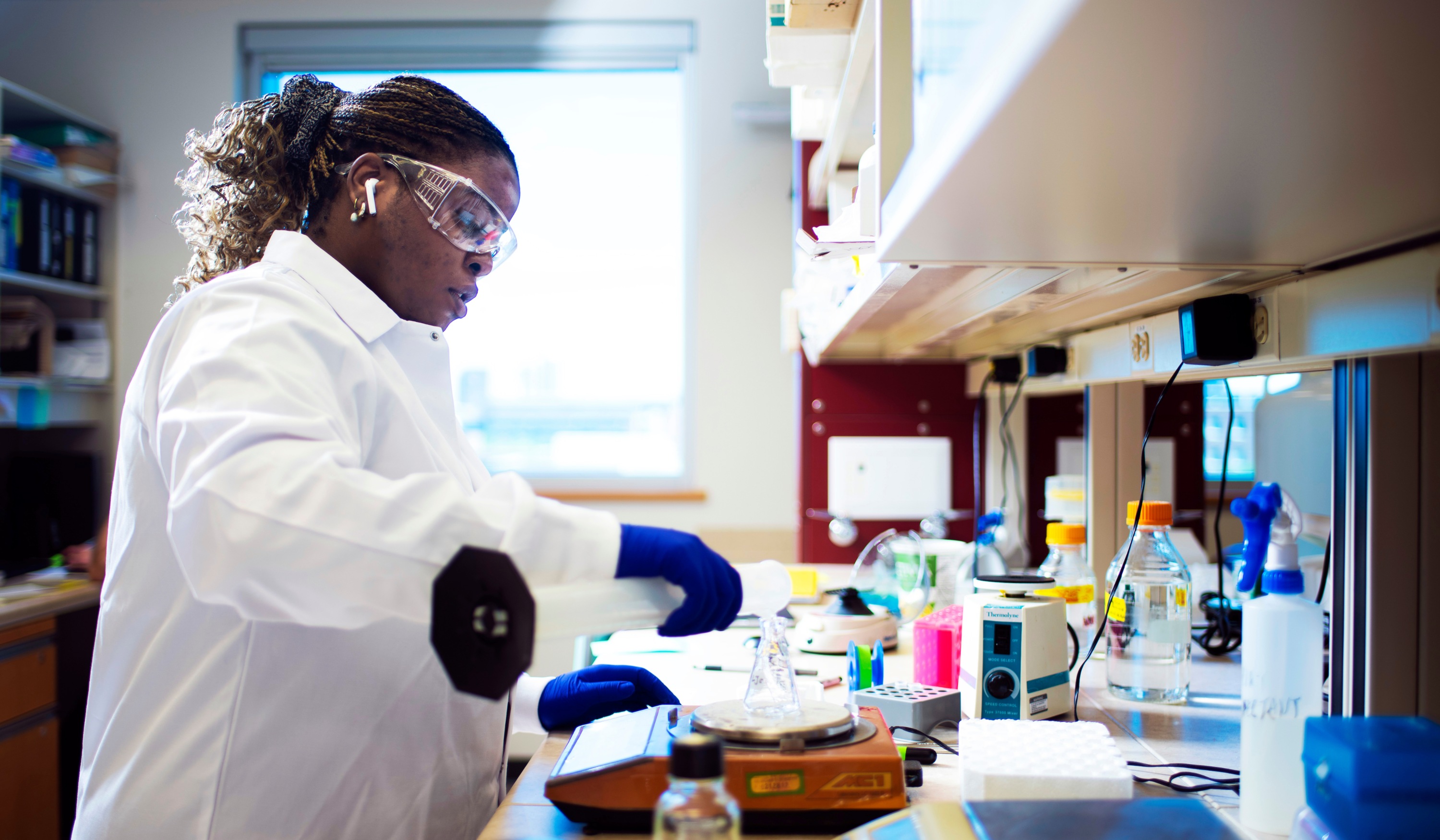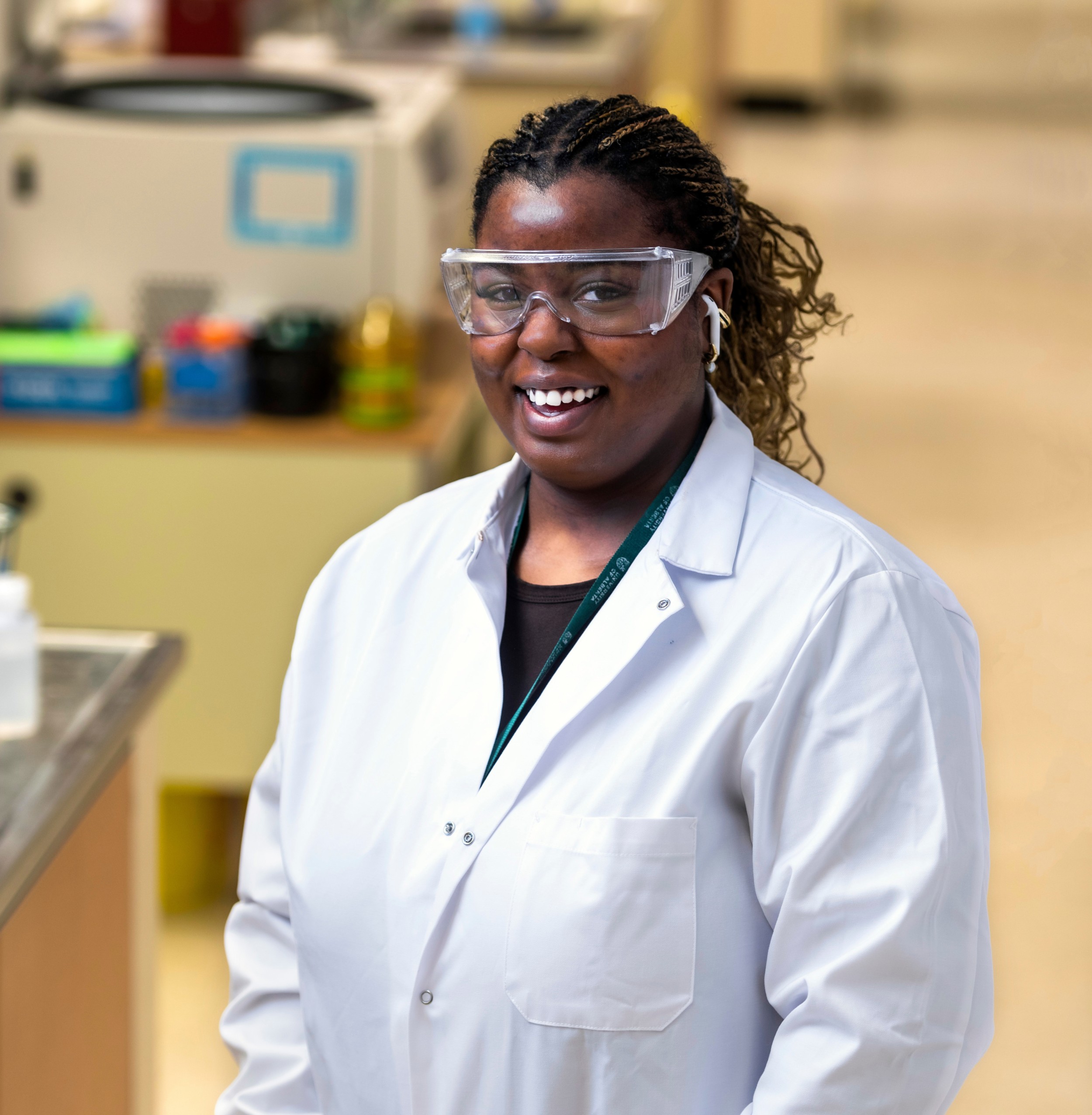When Emma Kasinyabo led a group of Grade 9 students through a research lab at the Li Ka Shing Institute of Virology, she challenged them with a pop quiz about the immune system.
See if you can get it, too.
Naked mole-rats can’t get cancer and certain breeds of duck have a protein that prevents them from getting sick with influenza, she told them.
“Why do those two facts matter?” asked Kasinyabo, a new bachelor of science graduate from the University of Alberta’s immunology and infection program jointly offered by the Faculty of Science and Faculty of Medicine & Dentistry.
“They immediately said, ‘Well, maybe we can find out why and apply it to humans,’” she marvels. “It’s crazy that they understood translational research at age 14, a concept I don't think I understood until maybe my first couple years of university.”
During her time at the U of A, translational research into fighting infectious diseases has gone from being something she understands to becoming her biggest passion. Now the future presents many possible paths: immunology researcher, surgeon, professor — or all of the above?
That’s because asking good questions, digging in to find answers and inspiring others to do the same comes naturally to Kasinyabo, according to her undergraduate mentor Vanessa Meier-Stephenson, an assistant professor of medicine and infectious disease researcher.
“What impressed me the most about Emma was her enthusiasm for the sciences and the way that she asks questions that stimulate more questions,” Meier-Stephenson says. “I think she would make a great researcher, but she has many different options in front of her.”
A family connection
Born in the Democratic Republic of the Congo, Kasinyabo came to Canada with her family as an infant so her father could study petroleum engineering. As the family moved from Montreal to Calgary, then to Edmonton and Fort McMurray, they spoke French, Swahili, Lingala and English at home and remained close to family members back in Africa. Learning that numerous family members — most recently a cousin and an uncle — had lost battles with infectious diseases that might not have been fatal here fired Kasinyabo’s curiosity.
“Congo is burdened with a lot of infectious diseases like Ebola, malaria, tuberculosis, leprosy and HIV. COVID was at the bottom of the list,” Kasinyabo explains.
She never got used to those deaths. When she took an introductory course in the Department of Medical Microbiology and Immunology and then faced her own bout of sepsis — a serious complication of infection — she knew this was the field she wanted to study.
A passion for learning and leading
Volunteer work that Kasinyabo has been doing since high school helped her realize her passion for learning and knack for teaching.
Her volunteer efforts were influenced by her older brother who was born with cerebral palsy, a motor disorder that affects his gait and the use of one hand.
“He has lived with a physical disability for his entire life. His constant willingness to learn and adapt is an inspiration to me every day,” she says.
Through volunteer roles with the Cerebral Palsy Association of Alberta and the Alberta Cerebral Palsy Sports Association, Kasinyabo has explored her fascination with how young people learn, including helping an eight-year-old girl with cerebral palsy learn to skate.
“I’m really interested in coaching or teaching to take advantage of that neuroplasticity that kids have when they have to learn something, even with a different ability, so they can find ways to maneuver around it and get it done their own way,” she says.
Collaboration leads to success
Her ability to coach has also come in handy in Meier-Stephenson’s research lab. She volunteered for a summer back in 2021 when Meier-Stephenson, then a newly hired faculty member, was setting up her research program focused on finding new drugs to treat chronic hepatitis B. Kasinyabo then won an undergraduate research award from the Li Ka Shing Institute of Virology to work in the lab last summer and has been awarded a Canadian Institutes of Health Research grant for this coming summer.
Kasinyabo, who served as vice-president of the Immunology and Infection Students' Association, has heard stories about research being uber-competitive. But she found others in U of A laboratories — including those run by famed virologists Lorne Tyrrell and Michael Houghton — to be supportive and helpful. In Meier-Stephenson’s laboratory she says she has found a collaborative environment in which everyone is encouraged to do their best work.
Their lab work involves testing drugs that shut down cancer-causing sections of DNA in diseased cells, hoping they will have an effect on similar sections of the DNA of chronic hepatitis B. Kasinyabo's role is to perform drug studies in hepatitis B infected cells, where she works in one of the lab's biohoods. As Meier-Stephenson’s lab team expanded, now including two graduate and eight undergraduate student researchers, Kasinyabo has taken on the role of supporter, teacher and mentor to the newer team members.
“I prefer a collaborative environment where no one's feeling afraid to say, ‘Oh, something didn't work,’ or ‘I just messed up,’” says Meier-Stephenson. “Emma is right there in it, and yes, sometimes an experiment doesn’t work for whatever reason, but she backs up and tries to figure out why.”
“That's research! And that's also what makes Emma a good researcher and great role model," she says.
Following one more summer in the lab, Kasinyabo plans to look for a position with a clinical trial, where she can gain experience working with patients. No matter what professional step she takes after that, she intends to continue volunteering.
“I'm going to stay with the community of people with disabilities and kids with whatever abilities,” she says. “I think community involvement and just being generous in that way is so rewarding.”

